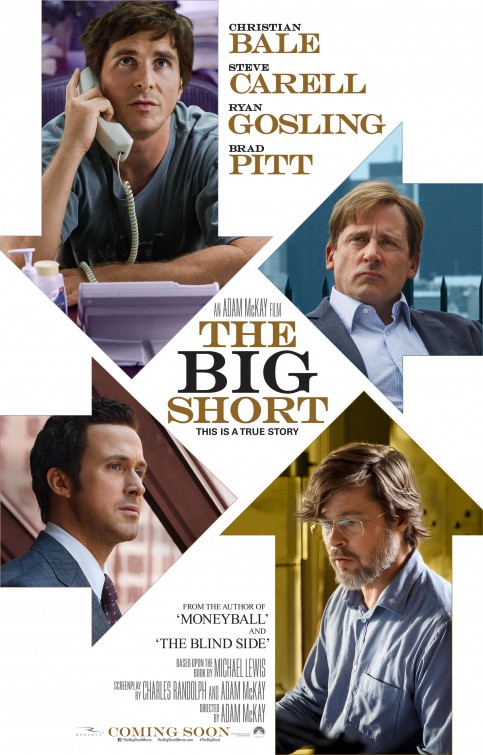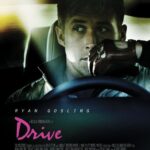This Is A True Story
Director
Adam McKay
Starring
Christian Bale
Ryan Gosling
Steve Carell
John Magaro
Finn Wittrock
Brad Pitt
I very much adhere to the age old observation that tragedy plus time equals comedy and without a doubt many of the big tragedies of the last ten years can be directly linked to the 2008 financial crisis. Opening in 2005, we are introduced to eccentric hedge fund manager Dr Michael Burry [Bale] who realises that the housing market is grossly unstable, despite being touted as resolute. Owing to this stability, his predictions are dismissed but due to a contractual clause he is allowed to bet against the housing market with investor’s money. Thanks to Burry’s subsequent meetings with various banks, bond salesman Jared Vennett [Gosling] acts in a similar manner and tries to get a bank to swap bonds in order to make himself a tidy sum when the crash eventually happens. The only group that seem to listen to him is a small cynical team managed by the blustering hedge fund manager Mark Baum [Carell]. After Vennett’s initial pitch, Baum and his team investigate the likelihood of a crash by flying to Miami to interview owners of huge houses, all desperate to sell and landlords who are three months behind on their payments. The last group we are introduced to are young pioneer investors Charlie Geller [Magaro] and Jamie Shipley [Wittrock] who are trying to get a seat at the trading table. In the process they discover the prediction and also bet against the market with the help of friend, mentor and retired banker Ben Rickert [Pitt]. Slowly the prospect of making an insane amount of money and personal wealth falls away as it becomes apparent that the industry is completely fraudulent, being run by meat-headed idiots and will likely spell a global economic catastrophe.
Technically speaking, this film is divided into three separate entities that circle the same subject matter but never cross over. Furthermore, it’s divided into three chapters, marked by quotations which set the tone for what follows: “It ain’t what you don’t know that gets you into trouble, it’s what you know for sure just ain’t so” “Truth is like poetry and most people fucking hate poetry” and “Everyone, deep in their hearts, is waiting for the end of the world to come.” But more interestingly, the film mirrors the process of getting drunk and doing something stupid; starting with the manic dizzying highs of slick dialogue and erratic fast editing to pushing into the jargon heavy rushing around and fumbling before eventually spiraling into a sullen crash as the comedy becomes drama.
The script does a commendable job of trying to convey perplexing and frankly tedious information (that was purposefully designed to sound as mundane as possible) to mainstream audiences and make the information somewhat palatable. I wouldn’t necessarily say they always achieve this but their take on how this is achieved with celebrity-fuelled allegory is novel to say the least. In truth, The Big Short explores the same themes as 2011’s Margin Call but both employ very different styles, methods and tones to get the severity of the situation across. One area of commonality between the two films is the exceptionally talented cast brought in as a visual and emotive guide for audience members who still don’t understand the intricacies. Much will be said of the four ‘leads’ but equally praiseworthy and notable performances are given by the supports. Sticking with the film’s self-imposed three struts, let’s break down the performance groups. First of all, we have Gosling and Carell supported by Jeremy Strong, Rafe Spall and Hamish Linklater. All five individuals offer unique and amusing personalities with Carell standing out as the most engaging and layered. Having Gosling’s character serve as the film’s narrator makes logical sense too, setting the tone early on with his confidence, energy and irritating charisma but also illustrating himself as “no saint”. The second strut is Brad Pitt accompanied by John Magaro and Finn Wittrock – although technically it’s the other way around but the general viewing public won’t see it that way. Using two incredibly talented young actors with the likes of Pitt acting as a friendly mentor works effortlessly in part because you immediately feel the parallel. And finally Christian Bale operating alone as the socially awkward man who discovers the pattern but like Cassandra of Greek mythology, nobody believes him. I have quite a bit to say about Bale as Burry but I’ll get back to that a little later. Most of the stark moments of realization should come from Bale’s number crunching but really it’s a combination of Charlie and Jamie, the zealous outsiders realising they are making bets against the US economy and Baum, the banker with a conscience, appalled by the cavalier attitude of those literally drilling holes in the lifeboats.
After a slew of half-pleasing, half-sophomoric comedies, Adam McKay has made an interesting leap with this film. His brightly lit, straight shot, performance driven experience plays off well here but unlike Scorsese’s The Wolf Of Wall Street, lacks truly experimental and bold directorial moments. But all-in-all the technical aspects are incredibly pleasing and competent throughout. One particular execution that I’m struggling with is having characters breaks the fourth wall to highlight when artistic license is taken with certain characters and historical plot points; it’s a nice touch and saves the audience saying the same thing but as it’s only used some of the time despite huge liberties and changes being made with other characters, interactions and events, it’s an odd array of what was highlighted and what wasn’t. Especially as they go out of their way to say “this actually happened.” But this is a bit of a minor quibble in an altogether pleasing affair.
Earlier I mentioned the structural nature of the film starting out as fast-paced and exciting before shining a harsh light on the truths of the situation. Sometimes this major shift in tone can be disastrous and leave a film feeling ruptured and segmented but thankfully, in this case, it mirrors the economic crisis rather well. That is, except for Michael Burry’s plot thread. Christian Bale’s segments, being so devoid of humour (and no, I do not count laughing at someone’s Asperger’s) really stand out from the rest of the film. It’s almost as if this quirky individual who triggers the entire plot is lifted from an entirely different film. His appearance rarely features commentary from Gosling, his dialogue is passionate, simple and lacking in humour, his interactions with others are earnest and panicked (more that he isn’t being believed than concerned for the world’s fiscal standing), it just strikes me as odd. Not in any way bad of course, just a little out of place. Like an antique clock in an otherwise entirely IKEA decorated living room.
Both this film and Margin Call exist as two sides of the same coin. They tell the exact same story presented in two very different ways but with a similar message, specifically the closing statement that it’s only a matter of time before it all happens again. One of my mine gripes with Margin Call was the fact that it was produced fairly close to the event and failed to highlight the extents of the effect – obviously because they weren’t known at that point. One of the points I really loved about the close of this film was the faux ending which shows a dejected and beaten Baum predicting that the banks would get away scot-free and people would just blame immigrants and the poor before Gosling’s narration explains that thankfully the banks were held accountable, broken up and those responsible served jail-time, only to then revert back and say “But that isn’t what was happened. Baum was right, the banks were bailed out by the taxpayers and people not only blamed immigrants and the poor but also teachers too” all before closing with an ominous statement about banks introducing a new gimmick which is basically bespoke CDO’s (the catalyst of the entire problem) by another name.
Release Date:
22nd January 2016
The Scene To Look Out For:
There is more than one example of bankers, speculators and realtors being portrayed as jock douchebags (or mindless thundercunts to use the British vernacular). Burly guys in suits, boasting of their percentage accomplishments, pumped and energized by marginalising others and manipulating the market for personal gain. From the arseholes chest-bumping and firing guns at a range to the grinning executives proudly saying how much they’re worth while doing the bank’s bidding and claiming to represent the investors. Audiences may not be able to understand half the things that are being said but watching our lead’s faces go from bamboozled to infuriated, while these idiots parade their achievements, is frankly beautiful. Manipulative but beautiful.
Notable Characters:
There are plenty of great performances in this release but Carell’s portrayal of Mark Baum has the most to it. We get a bit of a backstory, emotional drive, motivation, in-and-out of work supporting roles, personal life, ethical principles, foresight, control and a brash but winning personality. Every character has positive and negative traits but Baum is the most rounded and therefore the most rewarding. What’s more he fits in with the film’s most comedic and dramatic aspects and therefore never feels out of place.
Highlighted Quote:
“For fifteen thousand years, fraud and short sighted thinking have never, ever worked. Not once. Eventually you get caught, things go south. When the hell did we forget that?”
In A Few Words:
“A successful sober comedy that says a lot but owing to the nature of the source material, gets bogged down in a thick mire of convoluted terminology”
Total Score: 4/5
![The Red Right Hand Movie Reviews [Matthew Stogdon]](https://reviews.theredrighthand.co.uk/wp-content/uploads/2021/12/cropped-header1.png)




